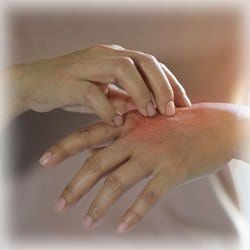What's the Difference Between Psoriasis and Eczema?
 Although some symptoms are similar for both psoriasis and eczema, here’s how to know which condition you may have.
Although some symptoms are similar for both psoriasis and eczema, here’s how to know which condition you may have.
Do you suffer from skin irritations that don’t easily go away with over-the-counter medications? If you find that you are suffering from constant skin issues that lotions and creams from the drug store can’t fix, you may have eczema or psoriasis.
Some symptoms of these two conditions include:
- Discolored skin
- Rashes
- Burning and itching
“Psoriasis and eczema have common symptoms so it can be difficult to know which condition you have without a medical exam,” says Timothy Almazan MD, PIH Health dermatologist in Whittier and La Mirada. If you suspect having either of these skin conditions, schedule an appointment with a dermatologist for the best treatment options.
Psoriasis
Plaque psoriasis is the most common type of psoriasis and may appear as red patches with silvery scales on lighter skin or more purple or discolored on darker skin tones. The patches may be thick and raised and most often appear on the knees, elbows, or torso. Psoriasis patches can also be on the face, scalp, or buttocks.
According to Dr. Almazan, “Psoriasis usually appears in early adulthood or later, but you can get it at any age.” The condition not only causes inflammation of the skin, but also inflammation inside the body. If this inflammation also affects your joints, it is referred to as psoriatic arthritis.
What causes Psoriasis?
Psoriasis is a chronic autoimmune disease which means that your immune system isn’t functioning properly, and your skin cells grow too fast.
Psoriasis and other conditions
If you have psoriasis, you may be more likely to have other conditions such as cardiovascular disease, type 2 diabetes, anxiety or depression. Since psoriasis is an autoimmune disorder, you’re also at an increased risk of developing other autoimmune diseases, such as lupus, celiac disease, inflammatory bowel disease (IBD) and multiple sclerosis (MS).
Eczema
Eczema causes the skin to become itchy and inflamed and have a rash-like appearance, but it is not an autoimmune disease. “It can occur in the same places on the body as psoriasis, but most often is found in the crooks of the knees and elbows,” shares Dr. Almazan. Affected areas can appear as dry red or brown patches. Eczema patches can be bumpy but are not as raised as they are if you have psoriasis.
Atopic dermatitis is the most common type of eczema. It affects more than 9.6 million children and about 16.5 million adults, according to the National Eczema Association. It typically begins in childhood, although it can develop at any age.
What causes Eczema?
Eczema can be genetic, and some researchers believe it can be caused by a genetic mutation that occurs on the protective outer layer of skin. Eczema can also be caused by environmental factors such as living in a dry environment or in an urban area with pollutants can trigger eczema.
Treatment for Eczema and Psoriasis
Whether you are diagnosed with eczema or psoriasis, treatments aimed at providing relief may be similar:
- Topical creams: Your doctor may prescribe a cream or recommend an over-the-counter treatment for mild cases.
- Light therapy: In this treatment, your skin is exposed to a healthy, controlled amount of UVB light under medical supervision. This helps reduce itching and inflammation, as well as boost your skin’s ability to fight bacteria.
- Oral medication: If your condition is severe, a doctor may prescribe systemics. This oral medication helps control your immune system response and reduce inflammation.
- Biologics: Delivered by injection or an IV infusion, this treatment targets the protein that creates the inflammation.
Unless your symptoms are very mild and improve with over-the-counter remedies, you will need to see a doctor for a diagnosis since all other treatments are available by prescription only.
If you have any questions about your skin or if you are looking for a dermatologist near your area, visit PIHHealth.org/Dermatology
Copyright 2023 © Baldwin Publishing, Inc. Health eCooks® is a registered trademark of Baldwin Publishing, Inc. Cook eKitchen™ is a designated trademark of Baldwin Publishing, Inc. Any duplication or distribution of the information contained herein without the express approval of Baldwin Publishing, Inc. is strictly prohibited.